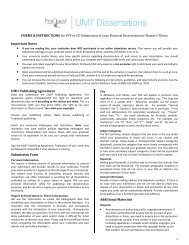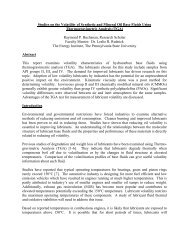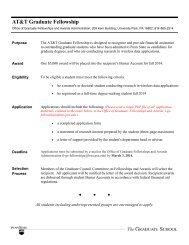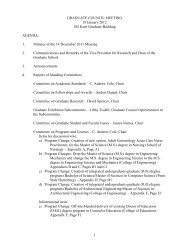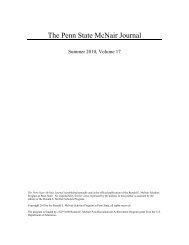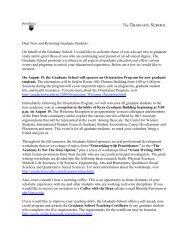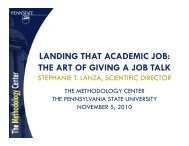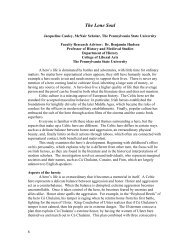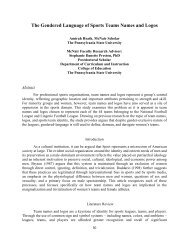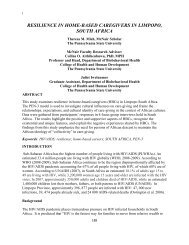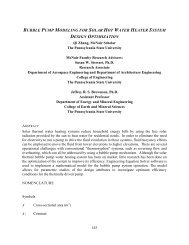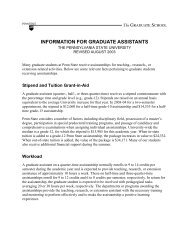1 GRADUATE COUNCIL MEETING 9 May 2012 102 Kern Graduate ...
1 GRADUATE COUNCIL MEETING 9 May 2012 102 Kern Graduate ...
1 GRADUATE COUNCIL MEETING 9 May 2012 102 Kern Graduate ...
Create successful ePaper yourself
Turn your PDF publications into a flip-book with our unique Google optimized e-Paper software.
F5<br />
music learning and teaching, and teaching as reflective practice. The program requires one fulltime<br />
year of residency at the University Park campus, and is designed to be completed in one<br />
academic year plus two summer semesters. Fulfillment of degree requirements includes<br />
successful completion of 30 credits of course work that includes a final action research project<br />
and resultant substantial article-length paper, followed by an oral presentation focusing on the<br />
candidate's projects and course work. This presentation, including questions posed by the faculty<br />
committee, serves as the final comprehensive examination. (Twenty credits must be earned at the<br />
University Park campus and 18 credits must be at the 500-level or higher.)<br />
The master of music degree (36 credits) provides five majors: Performance,<br />
Composition/Theory, Conducting, Piano Pedagogy and Performance, and Voice Performance<br />
and Pedagogy. The M.Mus. in Performance offers three separate curricula with areas of<br />
emphasis in Voice, Keyboard, or Orchestral Instruments. Depending on the area of emphasis, a<br />
recital, a composition project, or a conducting project is required. For the M.Mus. in<br />
Performance with emphasis in voice or keyboard, a master’s recital is required, in addition to<br />
either a master's paper or lecture-recital. For the M.Mus. in Performance (orchestral instruments),<br />
a master's recital is required. For the M.Mus. in Composition/Theory, a composition project and<br />
a master's paper are required. The M.Mus. in Conducting offers three areas of emphasis:<br />
Orchestral, Choral, or Band/Wind Ensemble. A performance project and a master's paper are<br />
required.<br />
In all master’s programs, at least one-half the required credits must be at the 500 level, and a<br />
comprehensive examination is required.<br />
[…]<br />
Music: Integrated Undergraduate-<strong>Graduate</strong> Degrees<br />
The School of Music offers six Integrated Undergraduate-<strong>Graduate</strong> degree programs--three that<br />
combine the B.A. in Music with the M.A. in Musicology, Music Theory, and Music Theory and<br />
History, and three that combine the B.M. in Performance with the M.A. in Musicology, Music<br />
Theory, and Music Theory and History. This enables a select number of students to further their<br />
research interests at the undergraduate and graduate levels. By the end of the five-year program<br />
students receive two degrees, a B.A. in Music and an M.A. in Musicology, Music Theory, or<br />
Music Theory and History, or a B.M. in Performance and an M.A. in Musicology, Music Theory,<br />
or Music Theory and History.<br />
Candidates for these Integrated Undergraduate-<strong>Graduate</strong> degrees must demonstrate a high level<br />
of aptitude and achievement in academic core courses and be highly motivated to pursue<br />
research projects with faculty.<br />
Modeled after a similar program in the Schreyer Honors College, this IUG program enables<br />
gifted music students to double count credits in two degree programs. As a result they will have<br />
developed a research focus during their fourth and fifth years, which will help them prepare for<br />
entry into doctoral programs at other institutions. For further information about the six<br />
Integrated Undergraduate-<strong>Graduate</strong> degree programs, including application procedures and<br />
degree requirements, see the School of Music web site.



